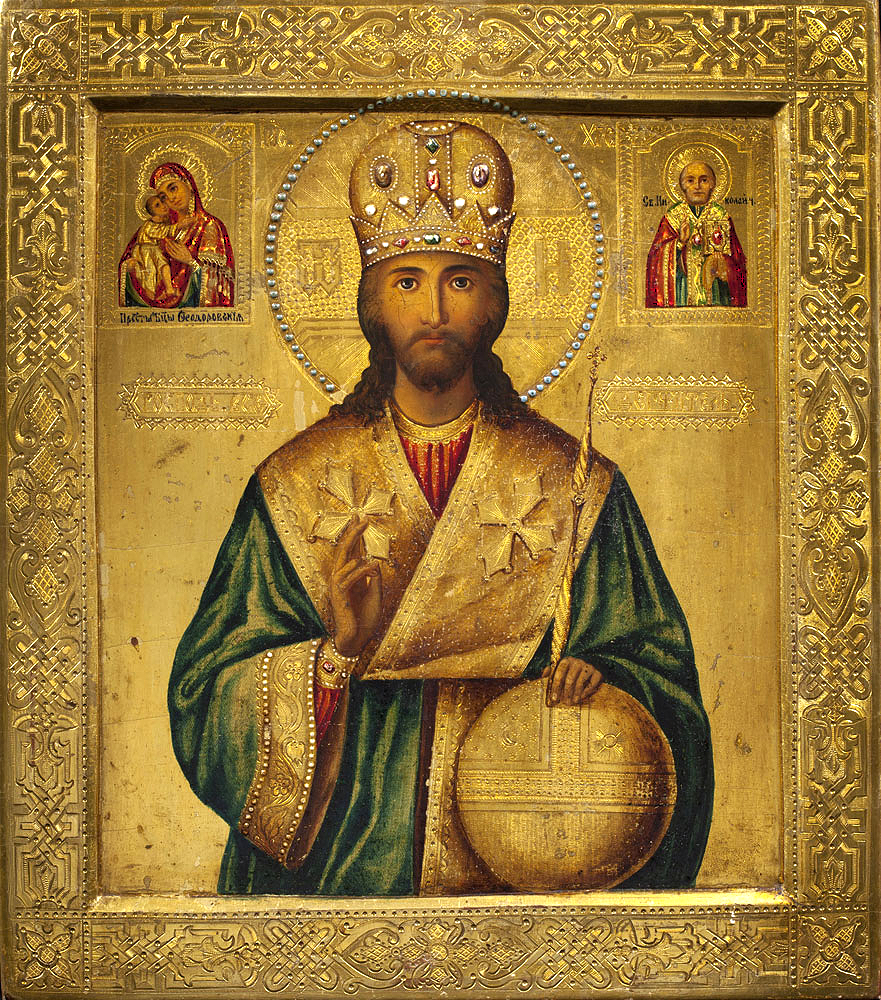Translation From the Holy Gospel According to John (18:33-37)
At that time: Pilate said to Jesus: Art thou the King of the Jews? Jesus answered: Sayest thou this thing of thyself, or have others told it thee of Me? Pilate answered: Am I a Jew? Thy own nation, and the chief priests, have delivered thee up to me: what hast thou done? Jesus answered: My kingdom is not of this world. If My kingdom were of this world, My servants would certainly strive that I should not be delivered to the Jews: but now My kingdom is not from hence. Pilate therefore said to him: Art thou a king then? Jesus answered: Thou sayest that I am a King. For this was I born, and for this came I into the world; that I should give testimony to the truth, everyone that is of the truth, heareth My voice.
A Message from Pope Benedict XV’s Humani Generis Redemptionem
To make your task easier in this matter, Venerable Brethren, We desire that hereafter severe judgment be passed on these two points: on the character, namely, and learning of those who seek to obtain authority to preach, just as is done on the character and learning of those priests, who would hear confessions. Whoever, therefore, is found defective in either regard must without any consideration whatever be debarred from a function for which he is not qualified. Your dignity demands this, since, as We have said, the preachers are your substitutes. The good of Holy Church demands it, for surely if any one should be the salt of the earth and the light of the world (Matt 5:13-14), it is the man who is engaged in the ministry of the Word. With these rules duly laid down it may seem superfluous to proceed further and explain what should be the purpose and method of the sacred function of preaching. For if we select our sacred orators in accordance with the norm given by Us, they cannot fail to be endowed with the requisite virtues, or set before themselves a worthy purpose or follow the right method in their preaching. Nevertheless it will be serviceable to throw some light on these two points, that thus the reason may become clearer why some fall short of the ideal of a good preacher.
The purpose which sacred orators should keep before their mind in performing their duty may be understood from the fact that they may and ought to say of themselves, as did St. Paul For Christ therefore we are ambassadors (2 Col 5:20). If then they are ambassadors of Christ they ought to have the same purpose in discharging their office that Christ had in conferring it on them, nay, the very one that Christ Himself had while living upon earth. For neither the Apostles, nor the preachers who followed the Apostles had a different mission from Christ’s: As the Father hath sent me, I also send you (John 20:21). Now we know why Christ descended from heaven, for He says expressly: For this came I into the world; that I should give testimony to the truth (John 18:37). I am come that they may have life (ibid., 10:10).
Both these purposes therefore must be carried out by the men who devote themselves to the sacred ministry of preaching. They must diffuse the light of truth made known by God, and in those who hear them they must quicken and nourish the supernatural life. In a word, by seeking the salvation of souls they are to promote the glory of God. As it would, therefore, be wrong to call anyone a doctor who does not practice medicine, or to style anyone a professor of some art who does not teach that art, he who in his preaching neglects to lead men to a fuller knowledge of God and on the way of eternal salvation may be called an idle declaimer, but not a preacher of the Gospel. And would there were no such declaimers! What motive is it that sways them mostly. Some are moved by the desire of vain-glory and to satisfy it: They ponder how they can express high rather than practical thoughts, causing weak minds to admire them, instead of working out the salvation of their hearers. They are ashamed of what is simple and plain, lest they be thought to know nothing else. They are ashamed to give milk to the little ones (Gilbert of Poitiers, Cant. Canticor. “Serm xxvii, 2.”). Whereas Jesus Christ proved by the lowliness of his hearers that He was the One whom men were awaiting: The poor have the Gospel preached to them (Matt 11:5). What efforts do such men make to acquire reputation by their sermons from the size and wealth of the cities and splendor of the great churches in which they preach? But since among the truths revealed by God there are some which frighten the weakness of our corrupt nature, and which therefore are not calculated to attract the multitude, they carefully avoid them, and treat themes, in which, the place accepted, there is nothing sacred. Not seldom it happens that in the very midst of a discourse upon the things of eternity, they turn to politics, particularly if any questions of this kind just then deeply engross the minds of their hearers. They seem to have only one aim, to please their hearers and curry favor with those whom St. Paul describes as having itching ears (2 Tim 6:3). Hence that unrestrained and undignified gesture such as may be seen on the stage or on the hustings, that effeminate lowering of the voice or those tragic outbursts; that diction peculiar to journalism; those frequent allusions to profane and non-Catholic literature, but not to the Sacred Scriptures or the Holy Fathers; finally that volubility of utterance often affected by them, wherewith they strike the ears and gain their hearers’ admiration, but give them no lesson to carry home. How sadly are those preachers deceived! Granted that they receive the applause of the uneducated, which they seek with such great favor, and not without sacrilege, is it really worth while when we consider that they are condemned by every prudent man, and, what is worse, have reason to fear the stern judgment of Christ?
Not all however who depart from the right rule and norm, Venerable Brethren, are seeking for nothing but popular applause in their preaching. Frequently the preachers who avail themselves of these devices do so to attain some other and even less honorable object. Forgetting the saying of Gregory: The priest does not preach that he may eat, but should eat that he may preach, (I Regum, lib. iii), there are not a few who, because they think that they are unsuited for other labors by which they might be decently supported, take to preaching, not that they may worthily exercise the sacred ministry, but to make money. We therefore see them devoting all their attention not indeed to finding where greater fruit for souls may be hoped for, but where preaching reaps a more lucrative return.
Now since nothing except harm and discredit can be expected for the Church from such as these, Venerable Brethren, you must exercise the greatest care, so that, if you detect any one for his own glory or for gain, abusing the office of preaching, you should at once remove him from that function. For the man who does not scruple to defile so holy an office by such an unworthy perversion of its end, surely will not hesitate to descend to any indignity, and will bring the stain of ignominy not merely upon himself, but upon the sacred office also which he so unworthily administers.
The same severity is to be shown towards those who fail to preach properly because they have neglected the acquisition of whatever is necessary for performing this function becomingly. What these conditions are We may learn from the example of him whom the Church has called “the Preacher of truth,” the Apostle St. Paul. Would that by God’s mercy We might have many more preachers like him!
The first lesson, therefore, that We learn from St. Paul is how well prepared and equipped he was for preaching. But We do not refer now to the learned studies he had assiduously pursued under Gamaliel. For the knowledge poured into his soul by revelation dimmed and nearly eclipsed the knowledge he had acquired by his own efforts, though that the latter knowledge was of no little value to him is clear from his Epistles. Learning, as We have said, is absolutely necessary for the preacher, for if he is without the light of learning he easily falls into error, since Ignorance is the mother of all errors, as the Fourth Lateran Council so truthfully observes. We would not be understood, however, to mean every sort of knowledge, but only that which it becomes a priest to possess, that is to say, the knowledge, to phrase it briefly, which consists of a knowledge of self, of God, and his duties. For self-knowledge, We maintain, will lead a priest to renounce his own advantage. The knowledge of God will lead him to make everyone else know and love God, and the knowledge of his office will lead him to discharge his own duties and to teach others to do theirs. If he lacks these three kinds of knowledge, whatever other learning he has, will only puff him up, and will be useless.



